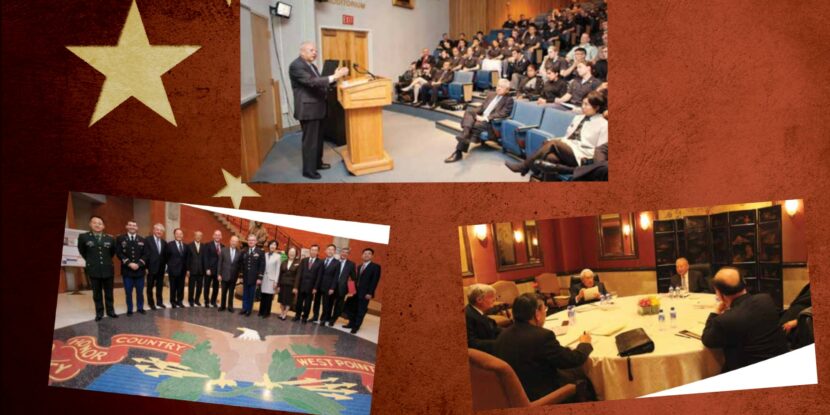The United States Military Academy at West Point hosted the Chairman of the Chinese Communist Party’s top propaganda effort that seeks to “influence foreign governments and other actors to take actions or adopt positions supportive of Beijing’s preferred policies” as a speaker, The National Pulse can reveal.
The United States Military Academy (USMA) has also partnered with state-run Chinese universities – including institutions accused of doubling as espionage and cyberattack training grounds and Xi Jinping’s alma mater – on exchange programs.
What’s more, West Point leadership has visited the China-based schools to call for increased collaboration, including a former superintendent “inviting national defense students at Peking University to attend the annual military training and competition at USMA.”
West (CC)Point.
The group – the China United States-Exchange Foundation (CUSEF) – saw founder Tung Chee-hwa speak at the West Point campus in 2012.
CUSEF brochures reveal that West Point was one of several American institutions Tung spoke at:

The brochure dedicates an entire page to Tung’s West Point visit, describing three key activities: “Foundation governors and supporters have group photo in West Point”; “Foundation Honorary Advisors Dr. Henry Kissinger, Mr. Robert Rubin, Mr. Tang Jiaxuan and Prof. Xu Kuangdi at meeting”; and “Foundation Chairman C.H. Tung delivers speech at West Point Academy”:

A brochure from Primary Source – a CUSEF partner that helps set curriculum for American schools – contains an excerpt of Tung’s speech which notes that “multilateral cooperation, particularly by the major powers, is crucial”:
“Building strategic mutual trust is about reaching a comprehensive and accurate understanding of each other’s path of development, strategic intention and foreign policy, it is also about understanding each other’s history, culture and values. Developing trust takes understanding, and developing understanding takes an active commitment to listening to and respecting each other’s goals and needs…. We should encourage two-way tourism; encourage two-way exchanges of arts, cultures and sports; encourage exchanges of visits of scholars and students…. The more we meet, the more we understand each other, the more we can create trust,” his speech continued.

The effort, according to the U.S. government report, aims to “to co-opt and neutralize sources of potential opposition to the policies and authority of its ruling Chinese Communist Party” and “influence overseas Chinese communities, foreign governments, and other actors to take actions or adopt positions supportive of Beijing’s preferred policies.”
What’s more, CUSEF has set out to “effectively disseminate positive messages to the media, key influencers and opinion leaders, and the general public” regarding the Chinese Communist Party, according to Foreign Agent Registration Act (FARA) filings with the Department of Justice.
The National Pulse has previously revealed CUSEF sponsoring trips to China for mainstream corporate media outlets in exchange for “favorable coverage” and for current and former elected U.S. officials “chosen based on their […] open-minded perspective to China.”
Compromised?
West Point has also seen its leadership collaborate with state-run Chinese universities and spearhead exchanges with schools such as Peking University and Tsinghua University.
Tsinghua – Xi Jinping’s alma mater –also has a “clear connection between them and the state administration for technology and industry in discussions on what [they] can do to help the national security,” according to former Senior Intelligence Officer in the Defense Intelligence Agency and State Department Official Nicholas Eftimiades.
The school has even launched cyberattacks against the U.S. government.
Since 2007, Peking University has sent students to study at West Point, with a press release noting participants “follow the same curriculum as West Point cadets, aimed at strengthening their leadership skills and teamwork, while building character”:
The two-week exchange program, during the forthcoming winter recess, will give them a taste of how the academy cultivates leadership qualities. The terms of the program, the first of its kind between West Point and PKU, were finalized over the weekend during a visit to the university by David Huntoon, West Point’s chancellor. Two West Point cadets are studying Chinese at PKU for a semester as part of the exchange program. A university official said the forthcoming selection would be open to students in all fields of studies. The selected students will follow the same curriculum as West Point cadets, aimed at strengthening their leadership skills and teamwork, while building character.
Dean of the West Point Academic Board Cindy Jebb traveled to Peking University in March of 2018, delivering a lecture on “The Academic Development of West Point Members.”
Jebb outlined “the cultivating patterns of West Point members’ academic life”:


